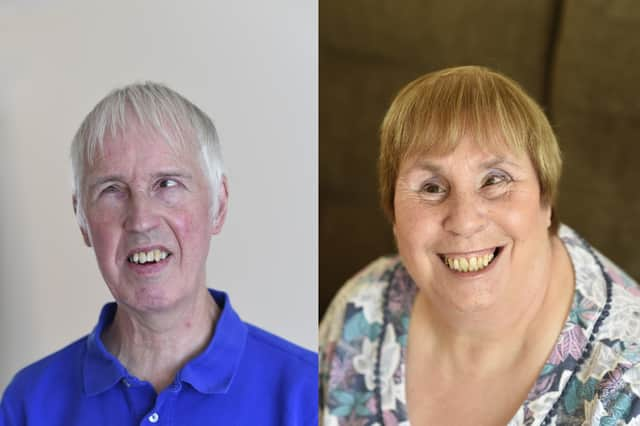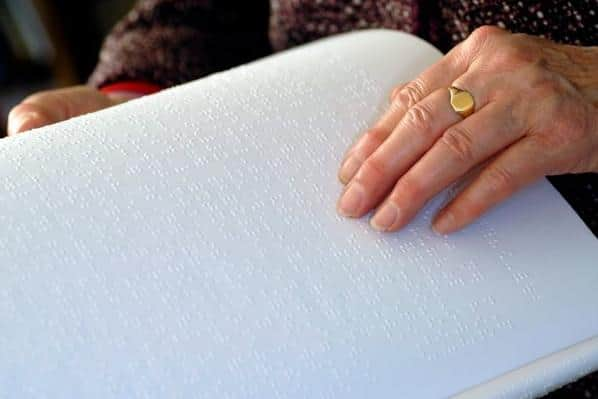Lisburn couple David and Margaret support RNIB’s braille campaign


Braille, the system of raised dots that has enabled blind people to read and write, is as vital as ever, despite the advances of new technology, says Northern Ireland’s leading sight loss charity, the Royal National Institute of Blind People (RNIB).
The braille system is based on variations of six dots, arranged in two columns of three (also known as a ‘cell’), representing the letters of the alphabet, punctuation symbols, or groups of letters to form shorthand at more advanced levels.
Advertisement
Advertisement
Alongside new technology such as audio-files and speech-reading software, braille technology has advanced from manual typewriter style braillers, to electronic refreshable braille displays that can link to computers and smartphones, enabling compact notetaking and use of digital devices on the go, and for work or education.


David Mann from Lisburn, who is registered severely sight impaired, says braille continues to play a pivotal role in his life: “Braille is very much in the 21st century. A lot of people still think that braille is only available as hard copy (on paper). Today, however, there is a wide range of devices which enable you to read and write “refreshable braille”, i.e. braille that appears on the equivalent of a screen and can be read, written, saved or amended just as anyone else might use a laptop, tablet, etc.
“Day to day, I get credit card and other bills in braille, enabling me to monitor my money without asking for anybody’s help.
“When I was still working, I could give presentations from braille notes and use a refreshable braille display keyboard on my computer and in meetings to take notes.
Advertisement
Advertisement
“Without the braille labelling which pharmaceutical companies are obliged to provide, I could not independently identify what medication I am taking, or identify my CDs and records (Yes, I still have CDs and records!)
“Although I love audio books, reading a novel in braille gives you so much more control over the way in which you read than listening to a voice could ever do.”
David’s wife Margaret is also registered blind and explains how braille enables her to have special moments with her grandchildren: “Reading Braille has enabled me to read stories to my children and grandchildren, and I look forward to doing this again with my great-granddaughter. It’s different reading it to them yourself in your own voice rather than listening to a stranger.
“Braille has also enabled me to sing in various choirs and in church which I enjoy greatly. As a child I could read for as long as I liked in the dark and when Mum said “lights out” it didn’t stop me reading!”
Advertisement
Advertisement
January 4 marked the anniversary of the birth of its inventor Louis Braille (1809-52), the Frenchman who himself became blind at the age of four.
“The invention of braille is often compared to the invention of the printing press for sighted people. For thousands across the world, braille means independence, knowledge and freedom,” said Robert Shilliday, RNIB Northern Ireland Director.
“Braille changes lives. It gives thousands of people independence and improved learning and literacy skills. From taking note of a phone number to checking a bank statement, the ability to read braille helps blind people be independent in so many ways every day and reduces the need for support.
“In the same way the invention of the printing press reduced but didn’t replace the use of pen, so braille is likely to remain useful for a huge range of everyday uses.
Advertisement
Advertisement
“Everyone has the right to have access to information in their preferred format whether that is large print, audio, or Braille. However, many blind and partially sighted people, of all ages, do not have access to information that sighted people rely on everyday.
“We’re campaigning to make access to information more than an afterthought. You can help us make a lasting difference to the lives of blind and partially sighted people here in Northern Ireland.”
Visit rnib.org.uk/campaignsni for more information.